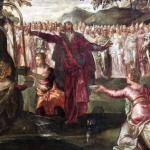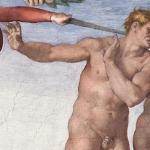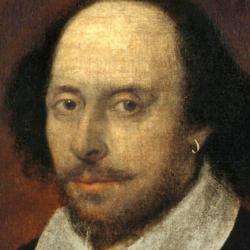Literary uses.
Many writers allude directly and indirectly to Hamlet the play and Hamlet the prince. Melville’s Pierre tears up his copy of Hamlet while vowing to act on the new revelations concerning his dead father. Goethe’s Wilhelm Meister aspires to produce Hamlet, Eliot alludes to Hamlet in Prufrock and Waste Land, and Kafka and Mallarme make use of the Hamlet character in their writing. This is not to mention those works overtly inspired by Hamlet, including Stoppard’s Rosencrantz and Guildenstern and Updike’s racy Gertrude and Claudius.
Perhaps the most famous literary use of the play is in Joyce’s Ulysses. Not only is Stephen Daedalus a Hamlet figure in his own right (an intellectual searching for a father, burdened with the vocation to put right what is wrong with Irish letters); not only is the novel pockmarked with quotations from Shakespeare’s play, but Daedalus offers an explicit theory about the origins of Hamlet. In the “Scylla and Charybdis” chapter set at the National Library of Dublin, Stephen argues for an autobiographical interpretation of the play:
The autobiographical interpretation does not posit a breach between Shakespeare and his father: “A father, Stephen said, battling against hopelessness, is a necessary evil. He wrote the play in the months that followed his father’s death. If you hold that he, a greying man with two marriageable daughters, with thirty five years of life, nel mezzo del cammin di nostra vita, with fifty of experience, is the beardless undergraduate from Wittenberg then you must hold that his seventyyear old mother is the lustful queen. No. The corpse of John Shakespeare does not walk the night. From hour to hour it rots and rots. He rests, disarmed of fatherhood, having devised that mystical estate upon his son. Boccaccio’s Calandrino was the first and last man who felt himself with child. Fatherhood, in the sense of conscious begetting, is unknown to man
man. It is a mystical estate, an apostolic succession, from only begetter to only begotten. On that mystery and not on the madonna which the cunning Italian intellect flung to the mob of Europe the church is founded and founded irremovably because founded, like the world, macro- and microcosm, upon the void. Upon incertitude, upon unlikelihood. Amor matris, subjective and objective genitive, may be the only true thing in life. Paternity may be a legal fiction. Who is the father of any son that any son should love him or he any son?”
Rather, the play arose form rivalry between Shakespeare and his brothers. Pointing to the recurring theme of three brothers in Shakespeare’s plays, Stephen argues as follows:
“—You will say those names were already in the chronicles from which he took the stuff of his plays. Why did he take them rather than others? Richard, a whoreson crookback, misbegotten, makes love to a widowed Ann (what’s in a name?), woos and wins her, a whoreson merry widow. Richard the conqueror, third brother, came after William the conquered. The other four acts of that play hang limply from that first. Of all his kings Richard is the only king unshielded by Shakespeare’s reverence, the angel of the world. Why is the underplot of King Lear in which Edmund figures lifted out of Sidney’s Arcadia and spatchcocked on to a Celtic legend older than history?
— That was Will’s way, John Eglinton defended. We should not now combine a Norse saga with an excerpt from a novel by George Meredith. Que voulez-vous? Moore would say. He puts Bohemia on the seacoast and makes Ulysses quote Aristotle.
— Why? Stephen answered himself. Because the theme of the false or the usurping or the adulterous brother or all three in one is to Shakespeare, what the poor is not, always with him. The note of banishment, banishment from the heart, banishment from home, sounds uninterruptedly from The Two Gentlemen of Verona onward till Prospero breaks his staff, buries it certain fathoms in the earth and drowns his book. It doubles itself in the middle of his life, reflects itself in another, repeats itself, protasis, epitasis, catastasis, catastrophe. It repeats itself again when he is near the grave, when his married daughter Susan, chip of the old block, is accused of adultery. But it was the original sin that darkened his understanding, weakened his will and left in him a strong inclination to evil. The words are those of my lords bishops of Maynooth: an original sin and, like original sin, committed by another in whose sin he too has sinned. It is between the lines of his last written words, it is petrified on his tombstone under which her four bones are not to be laid. Age has not withered it. Beauty and peace have not done it away. It is in infinite variety everywhere in the world he has created, in Much Ado about Nothing, twice in As You Like It, in The Tempest, in Hamlet, in Measure for Measure, and in all the other plays which I have not read.”
Psychological uses.
Freud himself devoted attention to Hamlet and inspired a disciple, Ernest Jones, to produce a paper, later published as a small book, on Hamlet and Oedipus. (Jacques Lacan, a latter-day doyen of psychoanalysis, also produced a lengthy analysis of the play.)
Freud believed that he had found the solution to what Jones called the “sphinx” of literary-critical problems, the problem of Hamlet’s delay. He suggested that “The play is built up on Hamlet’s hesitations over fulfilling the task of revenge that is assigned to him; but its text offers no reasons or motives for these hesitations and an immense variety of attempts at interpreting them have failed to produce a result. According to the view which was originated by Goethe and is still the prevailing one today, Hamlet represents the type of man whose power of direct action is paralyzed by and excessive development of his intellect.”
Freud offered psychoanalytic explanations for Hamlet’s delay, observing that Hamlet’s reasons are obscure not only to readers and viewers but to Hamlet himself, so thoroughly has he repressed certain desires. As he wrote to his colleague Wilhelm Fleiss in 1897, Hamlet’s treatment of Ophelia showed all the symptoms of hysteria brought on by his repressed Oedipal feelings, and Hamlet, like hysterical patients in general, brought destruction down on himself:
“Fleetingly the thought passed through my head that the same thing might be at the bottom of Hamlet as well. I am not thinking of Shakespeare’s conscious intention, but believe, rather, that a real event stimulated the poet to his representation, in that his unconscious understood the unconscious of his hero. How does Hamlet the hysteric justify his words, ‘Thus conscience does make cowards of us all’? How does he explain his irresolution in avenging his father by the murder of his uncle—the same man who sends his courtiers to their death without a scruple and who is positively precipitate in murdering Laertes? How better than through the torment he suffers from the obscure memory that he himself had contemplated the same deed against his father out of passion for his mother, and—‘use every man after his desert, and who should ‘scape whipping?’ His conscience is his unconscious sense of guilt. And is not his sexual alienation in his conversation with Ophelia typically hysterical? And his rejection of the instinct that seeks to beget children? And, finally, his transferral of the deed from his own father to Ophelia’s? And does he not in the end, in the same marvelous way as my hysterical patients, bring down punishment on himself by suffering the same fate as his father of being poisoned by the same rival?”
Freud developed this further in Interpretation of Dreams, under the heading of “dreams of the deaths of beloved persons”:
“Another of the great poetic tragedies, Shakespeare’s Hamlet, is rooted in the same soil as Oedipus Rex. But the whole difference in the psychic life of the two widely separated periods of civilization, and the progress, during the course of time, of repression in the emotional life of humanity, is manifested in the differing treatment of the same material. In Oedipus Rex the basic wish-phantasy of the child is brought to light and realized as it is in dreams; in Hamlet it remains repressed, and we learn of its existence- as we discover the relevant facts in a neurosis- only through the inhibitory effects which proceed from it. In the more modern drama, the curious fact that it is possible to remain in complete uncertainty as to the character of the hero has proved to be quite consistent with the over-powering effect of the tragedy. The play is based upon Hamlet’s hesitation in accomplishing the task of revenge assigned to him; the text does not give the cause or the motive of this hesitation, nor have the manifold attempts at interpretation succeeded in doing so. According to the still prevailing conception, a conception for which Goethe was first responsible. Hamlet represents the type of man whose active energy is paralyzed by excessive intellectual activity: ‘Sicklied o’er with the pale cast of thought.’ According to another conception. the poet has endeavoured to portray a morbid, irresolute character, on the verge of neurasthenia. The plot of the drama, however, shows us that Hamlet is by no means intended to appear as a character wholly incapable of action. On two separate occasions we see him assert himself: once in a sudden outburst of rage, when he stabs the eavesdropper behind the arras, and on the other occasion when he deliberately, and even craftily, with the complete unscrupulousness of a prince of the Renaissance, sends the two courtiers to the death which was intended for himself. What is it, then, that inhibits him in accomplishing the task which his father’s ghost has laid upon him? Here the explanation offers itself that it is the peculiar nature of this task. Hamlet is able to do anything but take vengeance upon the man who did away with his father and has taken his father’s place with his mother- the man who shows him in realization the repressed desires of his own childhood. The loathing which should have driven him to revenge is thus replaced by self-reproach, by conscientious scruples, which tell him that he himself is no better than the murderer whom he is required to punish. I have here translated into consciousness what had to remain unconscious in the mind of the hero; if anyone wishes to call Hamlet an hysterical subject I cannot but admit that this is the deduction to be drawn from my interpretation. The sexual aversion which Hamlet expresses in conversation with Ophelia is perfectly consistent with this deduction- the same sexual aversion which during the next few years was increasingly to take possession of the poet’s soul, until it found its supreme utterance in Timon of Athens. It can, of course, be only the poet’s own psychology with which we are confronted in Hamlet; and in a work on Shakespeare by Georg Brandes (1896) I find the statement that the drama was composed immediately after the death of Shakespeare’s father (1601)- that is to say, when he was still mourning his loss, and during a revival, as we may fairly assume, of his own childish feelings in respect of his father [this, NB, is the theory that Stephen Daedalus challenges in Joyce’s Ulysses – PJL]. It is known, too, that Shakespeare’s son, who died in childhood, bore the name of Hamnet (identical with Hamlet). Just as Hamlet treats of the relation of the son to his parents, so Macbeth, which was written about the same period, is based upon the theme of childlessness. Just as all neurotic symptoms, like dreams themselves, are capable of hyper-interpretation, and even require such hyper-interpretation before they become perfectly intelligible, so every genuine poetical creation must have proceeded from more than one motive, more than one impulse in the mind of the poet, and must admit of more than one interpretation. I have here attempted to interpret only the deepest stratum of impulses in the mind of the creative poet.”
In his 1910 essay, Jones, who claims to be closely following Freud, explains further: “As a child Hamlet had experienced the warmest affection for his mother, and this, as is always the case, had contained elements of a more or less dimly defined erotic quality. The presence of two traits in the Queen’s character go to corroborate this assumption, namely her markedly sensual nature, and her passionate fondness for her son.”
Further, “Now comes the father’s death and the mother’s second marriage. The long ‘repressed’ desire to take his father’s place in his mother’s affection is stimulated to unconscious activity by the sight of some one usurping this place exactly as he himself had once longed to do. More, this someone was a member of the same family, so that the actual usurpation further resembled the imaginary one in being incestuous. Without his being at all aware of it these ancient desires are ringing in his mind, are once more struggling to find expression, and need such an expenditure of energy again to ‘repress’ them that he is reduced to the deplorable mental state he himself so vividly depicts.”
As a result of this configuration, Hamlet’s hatred for his uncle cannot be brought to consciousness without simultaneously bringing to consciousness his own incestuous longings. Thus, “Much as he hates [Claudius], he can never denounce him with the ardent indignation that boils straight from his blood when he reproaches his mother, for the more vigorously he denounces his uncle the more powerfully does he stimulate to activity his own unconscious and ‘repressed’ complexes. He is therefore in a dilemma between on the one hand allowing his natural detestation of his uncle to have free play, a consummation which would make him aware of his own horrible wishes, and on the other ignoring the imperative call for vengeance that his obvious duty demands. He must either realize his own evil in denouncing his uncle’s, or strive to ignore, to condone and if possible even to forget the latter in continuing to ‘repress’ the former; his moral fate is bound up with his uncle’s for good or ill.”
Philosophical uses.
Philosophers have also found the post-Romantic Hamlet to be an unavoidable character. Nietzsche saw Hamlet as an embodiment of the only proper response to the careless injustice of history, namely disgust.
He compares the Dionysian man to Hamlet: “both have once looked truly into the essence of things, they have gained knowledge, and nausea inhibits action; for their action could not change anything in the eternal nature of things; they fell it to be ridiculous or humiliating that they should be asked to set right a world that is out of joint. Knowledge kills action; action requires veils of illusion: that is the doctrine of Hamlet, not that cheap wisdom of Jack the Dreamer who reflects too much and, as it were, from an excess of possibilities does not get around to action. Not reflection, no – true knowledge, an insight into the horrible truth, outweighs any motive for action, both in Hamlet and in the Dionysian man.”
Thus, “conscious of the truth he has once seen, man now sees everywhere only the horror or absurdity of existence; now he understands what is symbolic in Ophelia’s fate; now he understands the wisdom of the sylvan god, Silenus: he is nauseated.”
Derrida’s late Spectres of Marx brings Marx into the discussion. Derrida picked up on the “spectre” language at the beginning of the Communist Manifesto and Marx’s language of spectres and ghosts in describing the commodity in The German Ideology and elsewhere.
Derrida refuses to think that the spectral references are purely rhetorical, and speaks freely of Marx’s “spectrology”: “When Marx evokes spectres at the moment he analyses, for example, the mystical character or the becoming-fetish of the commodity, we should therefore not see in that only effects of rhetoric, turns of phrase that are contingent or merely apt to convince by striking the imagination. If that were the case, moreover, one would still have to explain their effectiveness in this respect. One would still have to reckon with the invincible force and the original power of the ‘ghost’ effect. One would have to say why it frightens or strikes the imagination, and what fear, imagination, their subject, the life of their subject, and so forth, are.”
Derrida ends this section of the book, a discussion of “ideology” with explicit references to Hamlet’s ghost: “If he loves justice at least, the ‘scholar’ of the future, the ‘Intellectual’ of tomorrow should learn it and from the ghost. He should learn to live by learning not how to make conversation with the ghost but how to talk with him, with her, how to let thus speak or how to give them back speech, even if it is in oneself, in the other, in the other in oneself: they are always there, spectres, even if they do not exist, even if they are no longer, even if they are not yet. They give us to rethink the ‘there’ as soon as we open our mouths, even at a colloquium and especially when one speaks there in a foreign language: Thou art a scholar; speak to it, Horatio.”
Walter Benjamin’s treatment of the development of German drama included meditations on Hamlet as the symbol of post-Reformation Europe, as Margret de Grazia says, “mourning in the aftermath of the Reformation the loss of meaningful action to a Lutheran theology of solafiedeism, ‘the philosophy of Wittenberg.’ With the renunciation of good works, ‘Human actions were deprived of all value,’ and a numbing acedia or taedium vitae set in.”
Carl Schmitt wrote a book on Hamlet after the war that took up and interacted with some of Benjamin’s ideas. According to one account, it was Schmitt’s way of explaining his own political stances: “The tragedy of Hamlet reveals to the audience the existential crisis that individuals in Shakespeare’s time were confronted with as a result of the Reformation: whether or not to choose Protestantism or Catholicism. It was an existential and politically loaded decision.”
One of the most interesting uses comes from Hegel. As Margreta de Grazia summarizes (“Hamlet’s Thoughts and Antics,” Early Modern Culture 2 [2001]), “Hegel, contemporary with Coleridge, appears to be the first philosopher to invoke Hamlet, in his Aesthetics, Phenomenology of Mind, and History of Philosophy. In the former, he singles out the play as representative of modern tragedy because Shakespeare’s Hamlet, unlike Sophocles’s Orestes, is driven not by an external agent or principle (Apollo or Justice) but by his own inner prompting — his ‘prophetic soul,’ ‘the seed of ruin’ contained within himself, the equivalent of Coleridge’s simultaneously generative and destructive ‘germ’. For Hegel, the play is an allegory of the dialectical movement of the spirit of consciousness toward self-realization. Hamlet’s ‘stops and starts’ externalize the bumpy trajectory of the dialectic as it progresses toward its goal. The plot sets up a kind of obstacle course of ‘colliding factors’ through which Hamlet advances against his own irresolution until in the final scenes, he is ‘bandied from pillar to post’ and ends up ‘sandbanked.’ Hamlet falls short of dialectical self-realization, and necessarily so. In 1600, he exists only on the threshold of modern consciousness; before the philosophical advances of Descartes, Spinoza, Kant, and, of course, Hegel himself, Hamlet can only get so far. At the conclusion of his History of Philosophy, Hegel turns to Hamlet for a metaphor by which to describe its long, hard, 2500-year trajectory, and finds an unlikely one: ‘Well said old mole. Cans’t work in the earth so fast?’ The old mole, like the spirit of consciousness, like Hamlet himself until the play’s end, tunnels arduously through earth toward the light that is the freedom of absolute self-determination.”
In Hegel’s own words: “The sandbank of finite condition will not content his spirit. As the focus of such mourning and weakness, such melancholy, such a loathing of all the conditions of life, we feel from the first that, hemmed within such an environment of horror, he is a lost man.” That lostness is a condition of his period: He lives in barbaric times, and is a barbarian. Yet, Hamlet strives to transcend that condition, and this suggests that Shakespeare invests his characters with “intelligence and imagination; and, by means of the image in which they-by virtue of that intelligence-contemplate themselves objectively as a work of art, he makes them free artists of themselves.”
Adorno, discussing the concept of will in post-Kantian philosophy, says, “As pure logos [Greek: logic] the will becomes a no-man’s land between the subject and the object, antinomical in a manner which was not envisioned by the critique of reason. – At the beginning of the self-reflection of the modern, self-emancipating subject, however, in Hamlet, the divergence between the insight and the act is paradigmatically displayed. The more the subject becomes an existent for itself and distances itself from an unbroken accord with pre-established order, the less are the deed and consciousness as one.”












